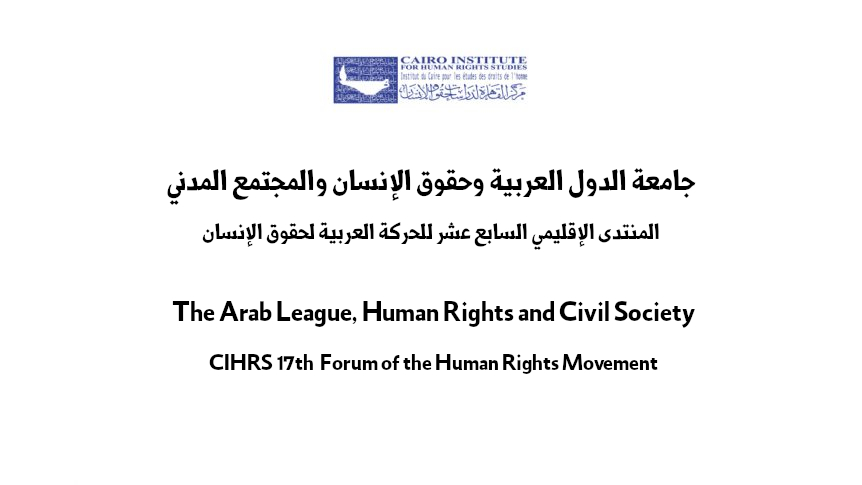In cooperation with the Arab Organization for Human Rights (AOHR) and the Egyptian Initiative for Personal Rights (EIPR), the Cairo Institute for Human Rights Studies (CIHRS) organized the 17th Regional Forum of Arab Human Rights Movement, held from February 16 to February 18, 2013 in Cairo. The forum included more than 50 human rights defenders, including representatives of regional and international NGOs, and human rights experts specializing in regional and global human rights mechanisms. The topic of this year’s forum was the challenges facing the Arab League in improving measures to protect and support human rights in the region. A vision was presented for reform and strengthening the human rights component of the Arab League.
The participants expressed their appreciation to Nabil El-Araby, Secretary General of the Arab League, and other representatives of the Arab League who supported the discussions. The participants also expressed their regret that Arab civil society organizations are still facing severe restrictions on participating in the political entities of the Arab League. Civil society organizations’ attendance in Arab League deliberations and discussions is still contingent upon the approval of the countries in which these organizations are registered.
The forum participants praised the Secretary General of the Arab League’s statement on the fourth anniversary of Arab Human Rights Day, in which he recognized the need to reform the Arab Charter on Human Rights and bring it in line with international human rights standards. El-Araby added that reforming universities and their human rights mechanisms has become an urgent demand that cannot be overlooked or neglected to ensure the full protection and support of human rights in the region. The participants were also encouraged by the Arab League’s stances regarding the deteriorating humanitarian and human rights situation in Syria, and the unprecedented steps taken by the League to address the human rights condition in Libya during the Libyan revolution.
Participants recommended for the Arab League to remain consistent with its decisions on human rights issues in different parts of the Arab region. Discussions continued with the Arab League’s need to confront other pressing human rights situations in the Arab region including in Bahrain, Saudi Arabia, Oman, the United Arab Emirates, Yemen, and the Occupied Palestinian Territory with the same determination with which they confronted the situations in Libya and Syria.
The forum also covered the role and responsibilities of member states to respect, protect and promote the universality of human rights, as stated in various international and regional conventions and agreements. There is no political, cultural, religious, or economic justification to disavow the obligations of all state and non-state actors in the Arab region to respect, protect, and fulfill universal human rights standards and principles.
Participants also emphasized the importance of linking efforts to reform the Arab League to the obligations of member states under international and regional human rights charters and treaties, to ensure respect for human rights. This goal should be achieved not only on national level but also on the regional and international levels. The Arab Human Rights Charter, in its current form, does not conform to international human rights standards, and lacks credible guarantees to fulfill the aspirations of peoples to create a successful human rights structure.
The participants recalled previous civil society initiatives and proposed recommendations, in order to provide a coherent and comprehensive vision of the mechanisms for ensuring real and effective reforms in the process of strengthening the League’s protection and support of human rights.These previous initiatives and proposed recommendations submitted to the League and its various bodies include the recommendations of the first and second Arab Civil Forum, which were held parallel to the two Arab League summits in 2004 and 2006, and the Civil Society Forum recommendations parallel to the Arab Economic and Social Summit held in 2013.
The discussions concluded by emphasizing the importance of effective change in the way the Arab League works with civil society organizations in order for the League to assume its new roles in democratic transition or in supporting or consulting civil society. Moreover, clear mechanisms and standards should be provided, based on transparency to ensure a permanent relationship with the different bodies of the Arab League.
Share this Post

